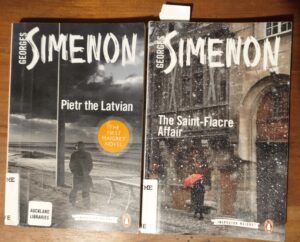Only three crime writers deserved a place in the history of 20th Century literature, according to a book I read back in the 1980s. The one that was presented as the obvious candidate was Georges Simenon. The others were acknowledged as more contentious choices, and I cannot remember who they were.
I’ve read the odd Simenon book over the years and always thought they were good. If there were a handful of books, I might have tried to read them all, but the man wrote 75 novels featuring his famous detective, Maigret, and more than 400 other books!
 So, Simenon was not high on my reading list. But something happened to me over the years: I have become increasingly intolerant in my reading habits. A few weeks ago, I abandoned a promising book because the character walked for two pages, seeing this and that – well-written descriptions, but not moving the story along at all. That was too much for me.
So, Simenon was not high on my reading list. But something happened to me over the years: I have become increasingly intolerant in my reading habits. A few weeks ago, I abandoned a promising book because the character walked for two pages, seeing this and that – well-written descriptions, but not moving the story along at all. That was too much for me.
See, I did say intolerant.
If it feels derivative, if the narration doesn’t have an appealing voice, if I sense emotional manipulation (especially of the “of Auschwitz” variety, the invocation of familiar horrors) I find something else to do, and the book mark stays in place for weeks or months until I finally accept that I will not pick up the story again and pull the marker from between the pages without even opening the book.
A few weeks ago, I was browsing in an op shop (charity second hand store, for those unfamiliar with the term) and in a box of books marked 3 for $1, I found two new-looking Simenon novels. I read both and ordered three or four more from the library. I’m now reading my fourth Simenon on the trot.
I can read them, because they’re not full of shit. (I know that’s not a literary term, but it captures my sentiments most accurately.) Simenon writes stripped prose. When he does spend a paragraph on a description, it is richly evocative. A fairly randomly chosen sample from today’s pages:
Maigret slept the sleep, at once troubled and sensual, that one only ever has in a cold country room that smells of stables, winter apples and hay. Draughts circulated all around him. And his sheets were frozen, except in the exact spot, the soft, intimate hollow that he had warmed with his body. Consequently, rolled up in a ball, he avoided making the slightest movement.
Simenon overdoes exclamation marks in the early books, but my sense is that they become less frequent later in the series.
Apart from the no-nonsense style, it is the subject matter that is so captivating. They are crime stories, yes, but the focus is on the perpetrator rather than the detective. It is about what moves people to do terrible things. Like Inspector Maigret, we are led to understand, not to judge.
Maigret is a strangely nebulous character, clearly described in the first book Pietr the Latvian (1930), and as far as I can tell, not really thereafter. He is large, wears an overcoat and smokes a pipe, and that’s about it.
That first book is also where some key precepts are described:
Inside every wrong-doer and crook there lives a human being. In addition, of course, there is an opponent in a game, and it is the player that the police are inclined to see. […] Maigret worked like any other policeman. […] But what he sought, what he waited and watched out for was the crack in the wall. In other words, the instant when the human being comes out from behind the opponent.
In exploring these cracks, Simenon is not only a cut above his fellow crime writers, but many supposedly literary writers too.